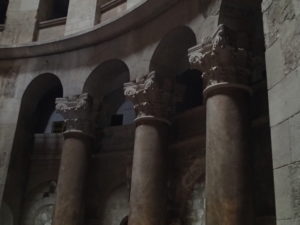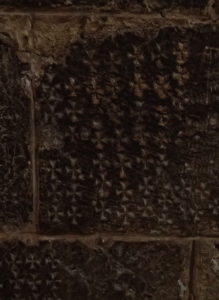In his poem “Childe Roland to the Dark Tower Came” Robert Browning’s hero, the young untried knight Roland, undertakes a journey that he believes to be his destiny, his fate, his raison d’être. This young Roland, like most young men, seeks the purpose for which he exists. Whether the hero of Browning’s poem finds that purpose at the end of his quest is by no means certain to the reader or to Roland. In a land that is harsh, confusing, meaningless, and ugly, one can reasonably argue that the best we can say for Browning’s Roland is that he perseveres.  And while perseverance is admirable, for Roland, it is nonetheless, probably futile. Neither the reader, the narrator, nor the hero himself can be sure of what he found at the end of his search. This is a fitting metaphor for the world that the graduates of St. Martin’s Academy will inherit when they leave their alma mater.
And while perseverance is admirable, for Roland, it is nonetheless, probably futile. Neither the reader, the narrator, nor the hero himself can be sure of what he found at the end of his search. This is a fitting metaphor for the world that the graduates of St. Martin’s Academy will inherit when they leave their alma mater.
In many ways, the purpose of educating young men at St. Martin’s Academy is to create young Paladins. Upon graduation, the students of St. Martin’s academy will inherit a cultural, political, moral, and spiritual milieu that is perhaps best described in the words of T.S. Eliot’s poem, “The Wasteland,” or Bob Dylan’s song “Desolation Row.” The loss of Christian influence in our culture is well documented in its far reaching effects. Our graduates will face challenges and trials that are different from, but similar to, those that the followers of the Lord Jesus have often faced in the last two thousand years. The loss is great and so, therefore, is the challenge for the next generation of Christian believers. The New Evangelization, like the old evangelization, will require courage, leadership, sacrifice, clarity of thought, and the power of heroic virtue. But from where does such a power come? How do we find and transmit such power? For more than almost two thousand years Holy Mother Church has taught that the wisdom, courage, strength, and transformative power of God is found in the Holy Sacrifice of the Mass and in Holy Communion. For that reason, Holy Mass must and will be at the center of St. Martin’s academic, social, and spiritual life.
Ad Deum qui laetificat juventutem meum. (To God, Who giveth joy to my youth.) –Psalm 42, Prayers at the foot of the Altar
Clearly, the students at St. Martin’s will need great power to accomplish the tasks that lie ahead of them as they strive to live out their vocations as citizens, husbands, fathers, priests, or religious. The power to accomplish their quests, to complete their pilgrimages, and faithfully to live out their vocation can only come from God, and that is why God gives us Holy Mass and Holy Communion. Holy Mass contains the power to create civilization as it transforms the reality of a fallen world. The Mass inspires beauty in art, music, poetry, literature, and architecture. The Mass has the power to transform bread and wine into the Body and Blood of Jesus. The Eucharist contains the power to transform sinners into saints, normal people into heroes, cowards into warriors, and boys into young men of exceptional valor and virtue. The Holy sacrifice has the power to give “those of us who are about to die” the joy of knowing that we are the adopted sons and daughters of the Eternal God and that He has shared His life with us. Saint John Vianney said “there is nothing so great as the Eucharist. If God had something more precious He would have given it to us.”

The Holy Sacrifice of the Mass and Holy Communion are central to the daily life of St. Martin’s Academy because without them we cannot accomplish our goal of serving God as He transforms boys into young men– young men who, like Charlemagne’s Roland, will struggle and fight bravely to protect, preserve, and defend their heavenly King by living out their vocations with honor and courage. To accomplish this task we will certainly rely on God’s Grace and the students’ cooperation with that Grace, but on a more practical and visible level, we will use Holy Mother Church’s traditional and opulent liturgical calendar. That calendar through Holy Mass and the Daily Office puts us in touch with our past, our imperfect present, and our glorious future. The liturgical calendar and the liturgy it serves requires respect and care for God’s physical creation, the earth from which we come (e.g. rogation days), and heaven (e.g. Mary queen of angels, the saints, prayers for the faithful departed, ) and the destination of our earthly pilgrimage. By conforming the lives of our students to the order of the liturgical year the students have the opportunity to experience and be formed by suffering, celebrating, confessing, giving thanks, feasting, fasting, sorrowing, caring for the earth, participating in mystery, honoring the old, and protecting the young. By living the Church’s liturgical year St. Martin’s Academy students will know their Catholic history, the lives of saints, the contributions of farmers, monks, soldiers, queens, shopkeepers, parents, children, and grandparents to God’s kingdom on earth. And, most importantly, they will learn that they too have something to contribute to God’s plan for making all things new in Christ. As the Venerable Cardinal John Henry Newman points out, every human being is created by God for a special purpose or work that only he can do.

